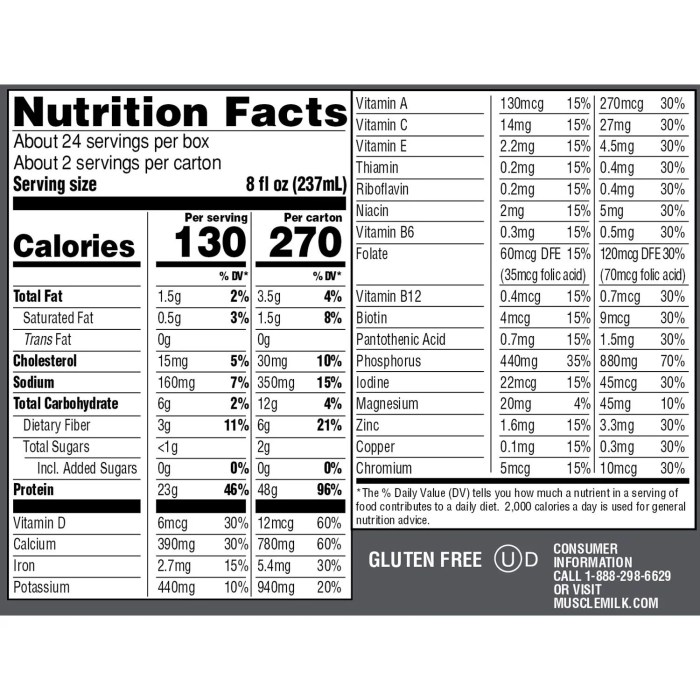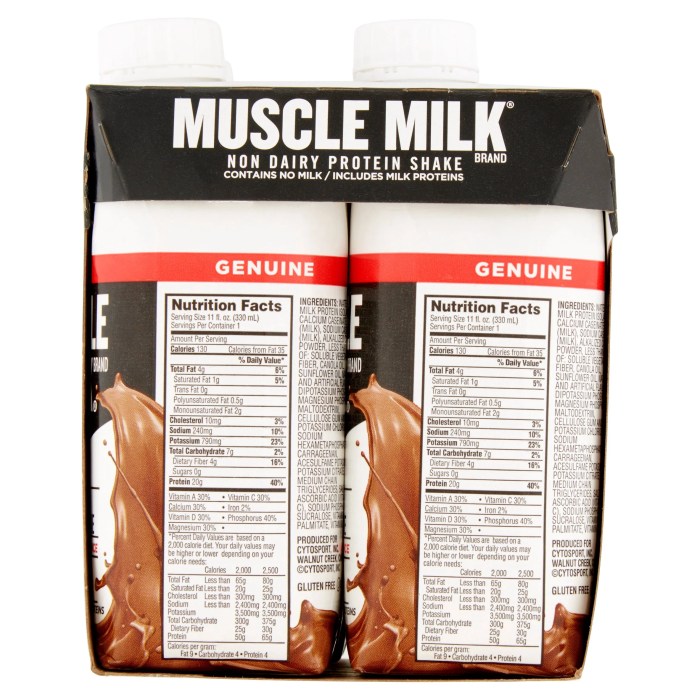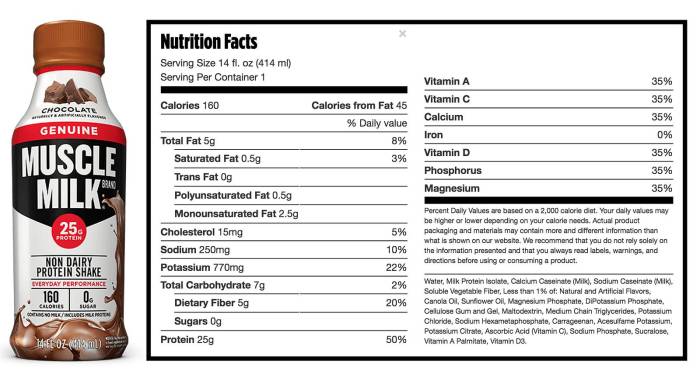Macro Nutrient Profile of Muscle Milk

Muscle milk nutrition facts – Muscle Milk, a popular protein shake, offers a blend of macronutrients designed to support muscle growth and recovery. Understanding its macronutrient profile is crucial for individuals incorporating it into their diet, allowing for informed choices regarding overall caloric intake and nutritional balance. This section details the macronutrient breakdown of a typical serving and compares it to other popular protein shake options.
Muscle Milk, a popular protein shake, boasts a high protein content, beneficial for muscle recovery. However, comparing its nutritional profile to other treats is important; for instance, you might be interested in seeing the nutritional breakdown of a different indulgence, such as og chimney cake nutrition facts , to understand the significant differences in caloric and macronutrient content.
Returning to Muscle Milk, remember to consider portion sizes to manage overall calorie intake effectively.
Muscle Milk Macronutrient Breakdown per Serving
The exact macronutrient content can vary slightly depending on the specific Muscle Milk flavor and serving size. However, a typical serving (one bottle or the equivalent amount from powder) generally provides the following:
| Nutrient | Amount per Serving | % Daily Value | Unit |
|---|---|---|---|
| Protein | 30-35 | 60-70% | grams |
| Carbohydrates | 20-30 | 7-10% | grams |
| Fat | 2-5 | 3-8% | grams |
*Note: The % Daily Value is an approximation and can vary based on individual dietary needs and recommended daily calorie intake.*
Comparison of Muscle Milk to Other Protein Shakes
Comparing Muscle Milk’s macronutrient profile to other popular protein shakes provides context for its place within the market. The following table presents a general comparison, keeping in mind that variations exist across different flavors and brands. It’s important to always check the nutrition label of the specific product you are considering.
| Product Name | Protein (grams) | Carbohydrates (grams) | Fat (grams) |
|---|---|---|---|
| Muscle Milk (average) | 32 | 25 | 3 |
| Optimum Nutrition Gold Standard 100% Whey (per scoop) | 24 | 3 | 1 |
| Premier Protein Shake (per bottle) | 30 | 10 | 2 |
| Herbalife Formula 1 (per scoop) | 18 | 20 | 5 |
Glycemic Index and Impact of Carbohydrates in Muscle Milk
Muscle Milk’s carbohydrate content contributes to its overall nutritional profile. The specific glycemic index (GI) of Muscle Milk varies depending on the specific formulation and added ingredients. However, generally, the carbohydrates in Muscle Milk are likely to have a moderate glycemic index, meaning they cause a relatively gradual rise in blood sugar levels compared to high-GI foods like white bread or candy.
This moderate GI is partly due to the presence of complex carbohydrates and other ingredients that may slow down the absorption rate. This slower absorption can help prevent significant blood sugar spikes and crashes, which can be beneficial for individuals managing their blood sugar levels or those looking for sustained energy. It is crucial to note that individual responses to carbohydrates can vary.
Potential Health Implications and Considerations

Muscle Milk, like any nutritional supplement, presents both benefits and potential drawbacks. Understanding these aspects is crucial for safe and effective integration into a healthy lifestyle. Regular consumption requires careful consideration of individual needs and potential interactions with existing health conditions or medications.
While Muscle Milk offers a convenient source of protein and other nutrients, over-reliance on it can lead to several issues. High sugar content in some formulations can contribute to weight gain, blood sugar imbalances, and increased risk of chronic diseases like type 2 diabetes. Furthermore, the high protein content, while beneficial for muscle growth, may strain the kidneys in individuals with pre-existing renal conditions.
Interactions with certain medications are also possible; for example, individuals on blood thinners should consult their physician before incorporating Muscle Milk into their diet, due to the potential impact of vitamin K on blood clotting. Finally, the artificial sweeteners and additives present in some varieties might cause digestive discomfort or allergic reactions in sensitive individuals.
Safe and Effective Consumption Guidelines
Safe and effective use of Muscle Milk hinges on mindful consumption and individual assessment. It’s not intended as a meal replacement for everyone, but rather as a supplement to a balanced diet and exercise regimen. Individuals with specific dietary needs, such as those with lactose intolerance, should opt for lactose-free varieties. Those with diabetes should carefully monitor their blood sugar levels after consuming Muscle Milk, and adjust their insulin dosage accordingly.
Always consult with a healthcare professional or registered dietitian before incorporating Muscle Milk into your diet, particularly if you have pre-existing health conditions or are taking medications. They can help determine the appropriate dosage and ensure it aligns with your individual health goals and limitations. It’s also vital to prioritize whole foods as the foundation of your diet, using Muscle Milk strategically to supplement, not replace, essential nutrients.
Nutritional Value Comparison: Muscle Milk vs. Whole Foods, Muscle milk nutrition facts
The following table compares the nutritional profile of Muscle Milk to whole food sources, highlighting the differences and emphasizing the importance of a balanced diet. While Muscle Milk offers a convenient protein boost, whole foods provide a broader range of micronutrients and fiber, crucial for overall health.
| Nutrient | Muscle Milk Source (per serving, example values – may vary by product) | Whole Food Source (example) | Comparison |
|---|---|---|---|
| Protein | 30g | 30g grilled chicken breast | Comparable protein content, but chicken provides additional micronutrients. |
| Carbohydrates | 25g (may vary significantly depending on flavor) | 25g sweet potato | Sweet potato offers fiber and other nutrients absent in Muscle Milk. |
| Fat | 5g | 5g Avocado | Avocado provides healthy fats and fiber, unlike Muscle Milk’s fat profile. |
| Vitamins & Minerals | Variable, often fortified but less comprehensive than whole foods | Variety of fruits and vegetables | Whole foods provide a broader spectrum of vitamins and minerals in naturally occurring forms. |
| Fiber | Low or absent | High in most whole foods (e.g., beans, whole grains) | Muscle Milk lacks the significant fiber content crucial for digestive health found in whole foods. |
Alternative Protein Shake Options and Comparisons: Muscle Milk Nutrition Facts

Choosing the right protein shake can depend on individual dietary needs and preferences. While Muscle Milk is a popular option, several alternatives offer comparable or even superior nutritional profiles depending on your goals. This section will explore some of these alternatives and compare them to Muscle Milk.
Alternative Protein Shake Examples
Understanding the variety available allows for informed choices based on specific dietary requirements and preferences. The following are examples of alternative protein shakes and their general nutritional characteristics. Note that specific nutritional information varies depending on flavor and serving size.
- Optimum Nutrition Gold Standard 100% Whey: A widely popular whey protein isolate known for its high protein content and relatively low carbohydrate and fat levels. It’s a good option for those prioritizing muscle growth and recovery.
- Isopure Zero Carb: This protein powder boasts virtually zero carbohydrates and minimal fat, making it ideal for individuals following low-carb or ketogenic diets. It primarily utilizes whey protein isolate.
- Orgain Organic Protein: This option prioritizes organic ingredients and often includes additional nutrients like fiber and probiotics. It typically contains a blend of protein sources, including brown rice protein and pea protein.
- Vega Sport Protein: A plant-based protein blend often featuring pea protein, brown rice protein, and sunflower seed protein. It is suitable for vegans and vegetarians and often includes added vitamins and minerals.
Comparison of Muscle Milk and Alternative Protein Shakes
A direct comparison of nutritional values and cost provides a clearer understanding of the differences between Muscle Milk and other popular brands. Note that prices can fluctuate based on retailer and promotions. The data presented below represents approximate averages.
| Brand | Protein Content (per serving) | Carbohydrate Content (per serving) | Price per Serving (approximate) |
|---|---|---|---|
| Muscle Milk | 30g | 16g | $3.00 |
| Optimum Nutrition Gold Standard 100% Whey | 24g | 3g | $2.50 |
| Isopure Zero Carb | 25g | <1g | $3.50 |
| Orgain Organic Protein | 21g | 7g | $4.00 |
Visual Representation of Nutritional Information
A bar chart provides a clear visual comparison of the macronutrient profiles of Muscle Milk and three alternatives. The chart would have four bars, one for each product (Muscle Milk, Optimum Nutrition Gold Standard 100% Whey, Isopure Zero Carb, and Orgain Organic Protein). Each bar would be divided into three sections representing protein (in grams), carbohydrates (in grams), and fat (in grams).
The height of each section would be proportional to the amount of each macronutrient. For example, if Muscle Milk has 30g of protein, 16g of carbs, and 5g of fat, its bar would have a protein section three times higher than its fat section. The chart would clearly show the differences in macronutrient composition between the various protein shakes, allowing for easy visual comparison of their nutritional profiles.
This visual aid would quickly highlight which protein shake best fits specific dietary needs and goals, whether it’s high protein, low carb, or a balanced blend.
Helpful Answers
Is Muscle Milk suitable for vegetarians or vegans?
No, most Muscle Milk varieties are not suitable for vegetarians or vegans due to the inclusion of whey protein, a dairy product. However, some Muscle Milk products may use plant-based protein sources; check the label carefully.
Can I use Muscle Milk if I have lactose intolerance?
Muscle Milk contains whey protein, which is a dairy product and may cause digestive issues for individuals with lactose intolerance. Look for lactose-free or low-lactose options if you have this condition. Alternatively, consider plant-based protein shakes.
Does Muscle Milk contain artificial sweeteners?
The presence of artificial sweeteners in Muscle Milk varies depending on the specific product. Always check the ingredient list on the packaging to determine if artificial sweeteners are included.
How should I store Muscle Milk?
Store Muscle Milk according to the instructions on the packaging. Generally, unopened products should be kept in a cool, dry place. Once opened, refrigerate and consume within the recommended timeframe.
Can I use Muscle Milk to replace a meal?
While Muscle Milk can be a convenient supplement, it’s generally not recommended as a complete meal replacement. It lacks the fiber and micronutrient diversity of whole foods. Use it as a supplement to a balanced diet.
